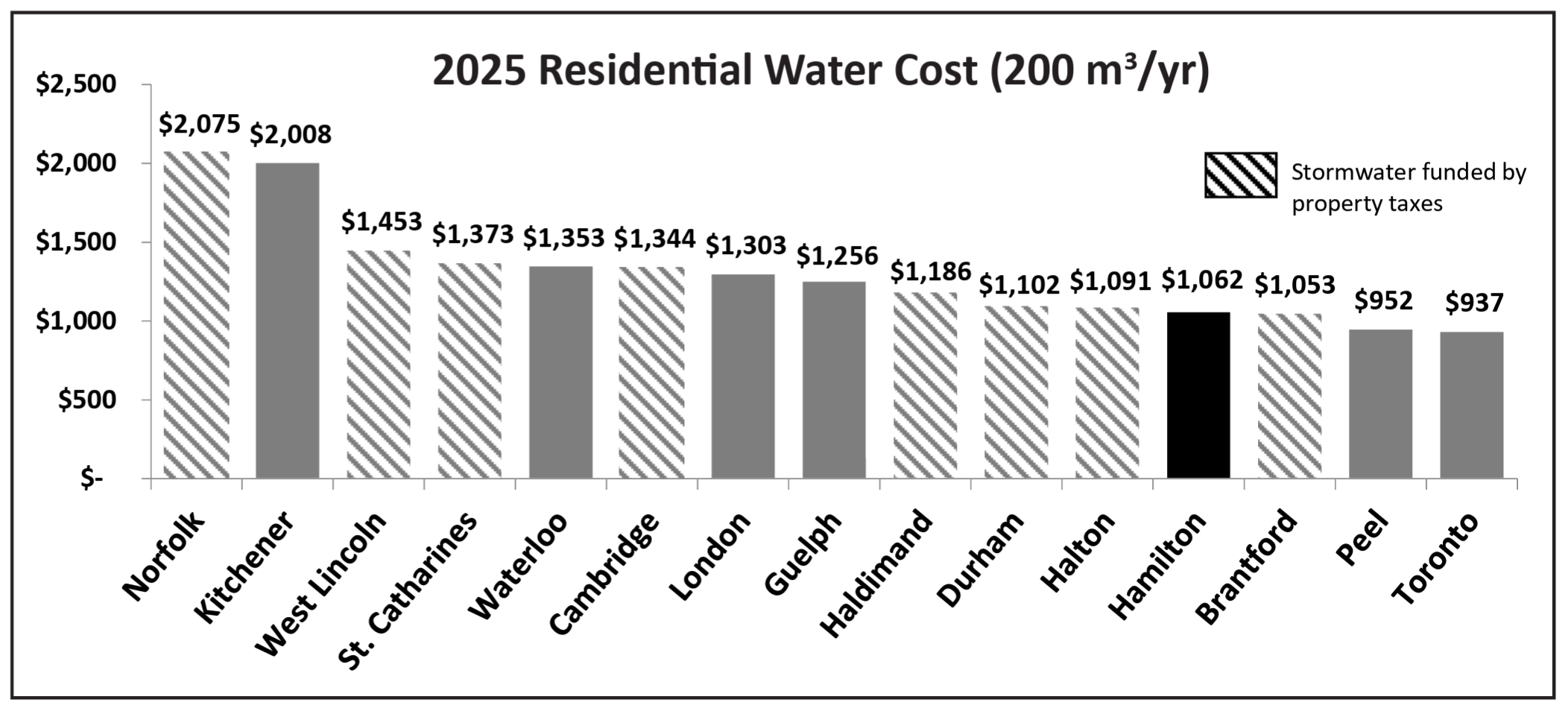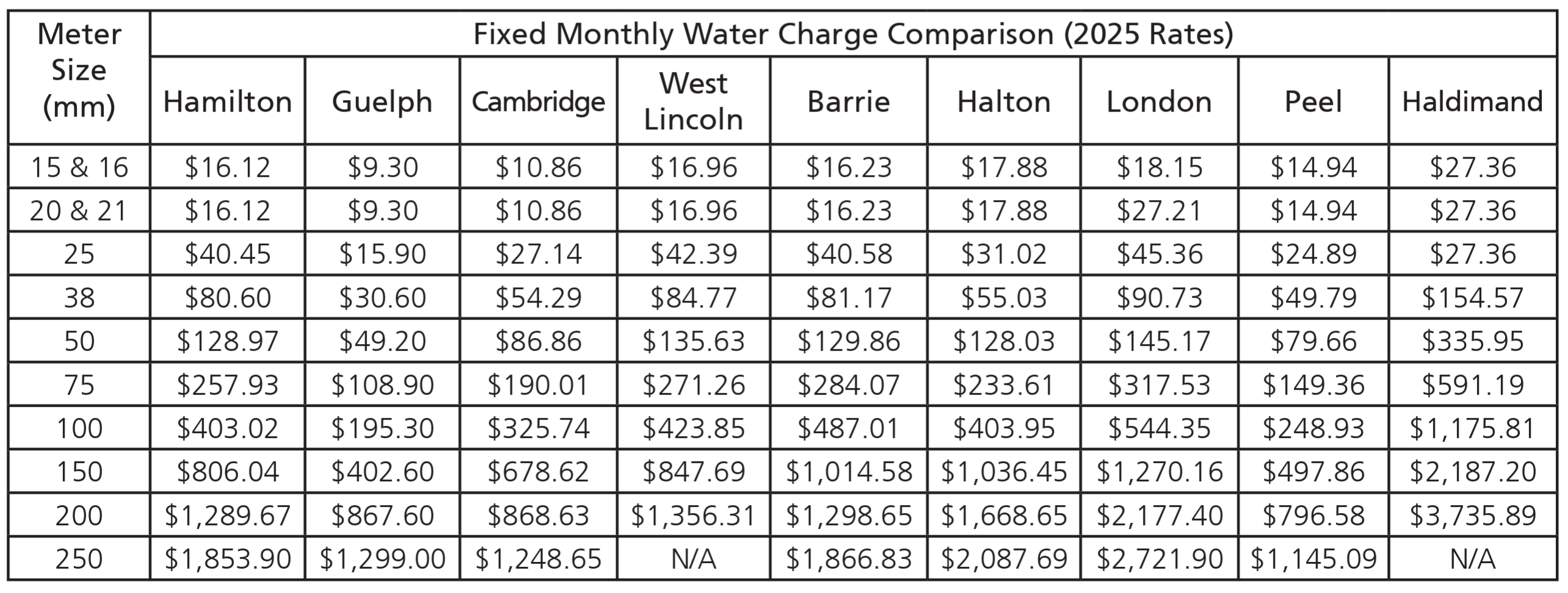
Attention Hamilton Water Billing Customers: We’re making changes to improve your water and electricity billing. To learn more, please visit: Important Notice to Municipal Water Customers
Please find the answers to Hamilton general water FAQs below. To access FAQs for Private Fire Line and Sewer Discharge Permits, click here.
An average household that annually consumes 200 cubic metres of water will pay an additional $77.65 per year or $6.47 each month.
Hamilton’s water and wastewater/storm rates are among the lowest in Ontario (shown below) compared to the average 2025 household bill. Note that some municipalities change their rates at different points of the year.

The following chart provides 2025 fixed charges restated monthly for comparison purposes with other Ontario municipalities:

If we were to create a fixed charge for a minimum amount of water, the fixed charge would have to be higher to cover the related fixed costs. A fixed price would penalize those who practice conservation or do not use the minimum amount of water monthly.
Water and wastewater budgets contain fixed costs. These costs do not change based on water consumption. The cost to distribute, collect, and treat municipal water and wastewater throughout the City remains relatively constant, regardless of the water used by all residents. Capital renewal and expansion of the City’s overall water/wastewater/storm infrastructure is the largest portion of your bill because it has a replacement value of $10.1 billion. Aging City infrastructure becomes more costly to operate, maintain, and replace. Nearly 20% of our city’s water and sewer mains are more than 80 years old.
In a way, water is like a two-way toll bridge: it costs to come and leave. Turning lake or groundwater into safe drinking water has a cost. Cleaning wastewater for its return to the environment has another charge. Fortunately, the Hamilton residents pay lower rates than much of Ontario for drinking water and wastewater treatment services.
Customers are sometimes surprised to find their wastewater/storm bill to be as much as or even more than their water bill. How can this be?
It is not unusual for a wastewater/storm bill to be higher than the corresponding water bill across the country. As environmental regulations have become stricter over the past few decades, the costs of treating wastewater and managing stormwater to required levels have risen substantially.
Wastewater/storm charges are higher than water costs for many reasons:
- The cost of wastewater line maintenance and construction due to the differences between the systems for water distribution and wastewater collection. Drinking water flows through pressurized pipelines. It can move uphill and downhill, meaning that we construct water pipelines at minimum depth below the ground surface, often above the rock layers. Wastewater must flow by gravity – downhill the whole way. In rolling terrain, sewer lines must sometimes be built deep beneath the ground, well into hard rock. Trench excavation – especially in rock - is the largest part of the cost of building a pipeline. The deeper the pipe, the higher the cost of construction.
- The sizes of drinking water distribution and wastewater collection systems also affect costs. Like many other municipalities, Hamilton serves more of its citizens with public drinking water than with sewer service. Many water customers are on septic tanks instead of sewers. The water utility has a larger customer base to support its operating costs, lowering individual customers’ costs. Hamilton has approximately 3,300 more water customers than those with both water and wastewater service.
- The complexity of wastewater treatment has increased dramatically over the years. Over the last couple of decades, treatment has evolved to include sophisticated biological systems for removing organic materials, complicated filters, and modern disinfection methods. The water released by the treatment facility has become increasingly cleaner. The advanced systems are costly to build and operate, increasing the overall cost of wastewater treatment, in most cases.
The City recognizes that the best means of charging for wastewater would be to have separate meters for sewage and water. Unfortunately, the market currently does not have maintenance-free sewage meters for private residences. To install separate meters and maintain them would dramatically increase capital and operating costs. Thus, most municipalities in Ontario base the wastewater charge on the metered water consumption.
The City is responsible for the initial installation, replacement, and repair of the meter. All newly constructed or renovated properties must install water meters at their own expense. Property owners are responsible for protecting the water meter and ensuring that negligence or freezing temperatures do not damage it. Property owners may also be responsible for replacing the meter if it is lost, stolen or damaged.
Water meters have a measurement device in an ‘inner chamber’ that records the amount of water that goes through the meter. Most meters in one, two, and three-family homes record water in cubic metres. A cubic metre of water is equivalent to 1,000 litres of water.
If you question your bills and feel that your meter is recording incorrectly, you may ask for a meter accuracy test from the town. This test is not free, and the applicable service fee varies with the meter size; the 2026 meter accuracy test fee for residential meters (15 – 16 mm) is $577.20 (includes HST).
Unless the test finds the meter to be registering more than 2% in error, the property owner is responsible for the test’s cost and the water meter’s replacement cost. Otherwise, the city will cover some of the charges. The fee includes removal of the existing meter and installation of a replacement meter.
The Water Meter Testing Request Form must be completed and returned to Alectra Utilities for Alectra to perform the test.
All water meters approved for use by the City read much like a car odometer. Please visit How to read your meter for more information.
Any problems that occur with your water meter, you should call Hamilton Water Customer Service at 905-546-2489 during business hours (M-F 8:30 am to 4:30 pm) to schedule an appointment to have the meter inspected and repaired if necessary.
A sudden rise in your metered water bill amount may be due to several reasons, including:
- Plumbing leaks in toilets and fixtures
- Consecutive estimated readings followed by an actual reading. (If your actual consumption for previous billing periods was higher than what was estimated, you might see an increase in your current water bill which will reflect the unbilled consumption.)
- An increase in the number of people living in the house causes more water use.
- A dry, hot summer, resulting in higher water consumption, and an increase in the number of days in the billing period
Leaks cause high bills. If you know you have a water leak in your house, you must repair it immediately to save your money. It is essential to check for leaks on your property. Leaking toilets and other fixtures waste a lot of water and make your bill expensive. All water consumption, including water consumed by leaks, is the property owner’s responsibility.
In almost every case, the homeowner’s plumbing causes the high bills. To check for leaks, locate the “trickle indicator’ - a small red or black triangle on your water meter. Ensure water is not running in the house or building, and then check to see if the trickle indicator is turning, moving, or shaking. If it is, you have a leak somewhere. The homeowner is responsible for all plumbing repairs and maintenance. The City is not responsible for internal plumbing leaks.
How do I check for leaks?
Faucets
Check all faucets and piping for leaks by monitoring for water drips under sinks and exposed pipes. Perform an inspection with the water on and off, as some leaks only occur when the water is on.
Toilets
Some toilet leaks are intermittent, so you don’t always see or hear the water running. To check if your toilet seeps, lift the lid off the water tank, drop in some food colouring or brewed tea or coffee and come back in 20 minutes. (Don’t flush the toilet while you are waiting). If colour appears in the toilet bowl, the rod-and-ball assembly or flapper needs adjustment or replacement.
Other Issues
- Check the plumbing in the basement by monitoring for drips of water coming from exposed pipes.
- Occasionally, leaks develop behind walls or in areas that are not visible. Read your meter periodically to monitor for drastic changes.
Leaks cost you money as all water passing through the meter shall be charged for whether used or wasted:
- 1/16” A continuous leak creating a stream of water this size would waste 93 m3 of water.
- 1/8” A continuous leak creating a stream of water this size would waste 372 m3 of water.
- 1/4” A continuous leak creating a stream of water this size would waste 1,491 m3 of water.
The City is responsible for water services located between your property line and the municipal water main. It is sometimes necessary to connect homes and businesses to a bypass system to ensure uninterrupted municipal water delivery during a watermain repair or replacement when the municipal water main is frozen or for other operational reasons.
The bypass system typically consists of connecting your outdoor water faucet to a hose specially designed to carry potable drinking water. It is essential not to disconnect or turn off your outdoor faucet while this bypass system is in place.
Your water consumption will not be metered when receiving water from the bypass system.
Your water consumption for billing purposes will be based on your average daily consumption during the same period last year.
Once the construction work is completed, the bypass system will be discontinued so that your water service will be restored, allowing your water consumption to be once more metered. Your billing will return to be based on your measured water consumption now.
For more information about water main construction projects, please contact the Public Works Construction Section of the City of Hamilton @ 905-546-4313.
Yes, the Ontario Government funds the Home Hemodialysis Utility Grant program. If you are on home hemodialysis, the first step is to contact the Home Dialysis Coordinator in your Regional Renal Program. For more information on how to enroll for this Grant, read Home Hemodialysis Utility Grant.